Protection: Initiatives that help our communities and ecosystems thrive
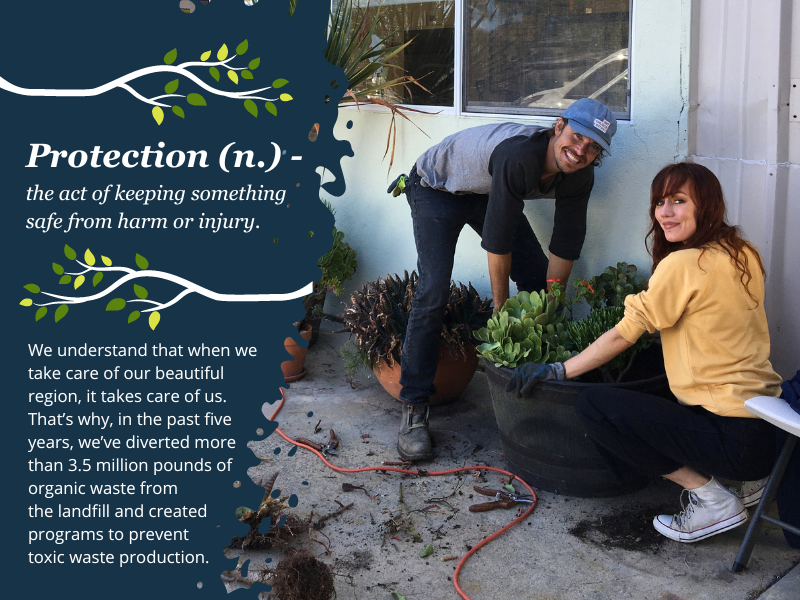
At Solana Center for Environmental Innovation, we center our work around four pillars: protection, conservation, education, and innovation. Each pillar provides the structure needed to fully address the impacts of climate change in the San Diego region:
–Protection, or the safeguarding of the rights of humans and living things to healthy environments with sufficient natural resources;
–Conservation, or the stewarding and restoration of natural features such as soil, water, and an atmosphere with a smaller concentration of greenhouse gases;
–Education, or the provision of the knowledge and tools necessary for community members, organizations, students, and businesses to take an active role in creating a more sustainable world; and
–Innovation, or the ability to let go of existing frameworks of what is to imagine what could be, prioritizing the well-being of the planet and its creatures and establishing closed-loop processes to manage resources.
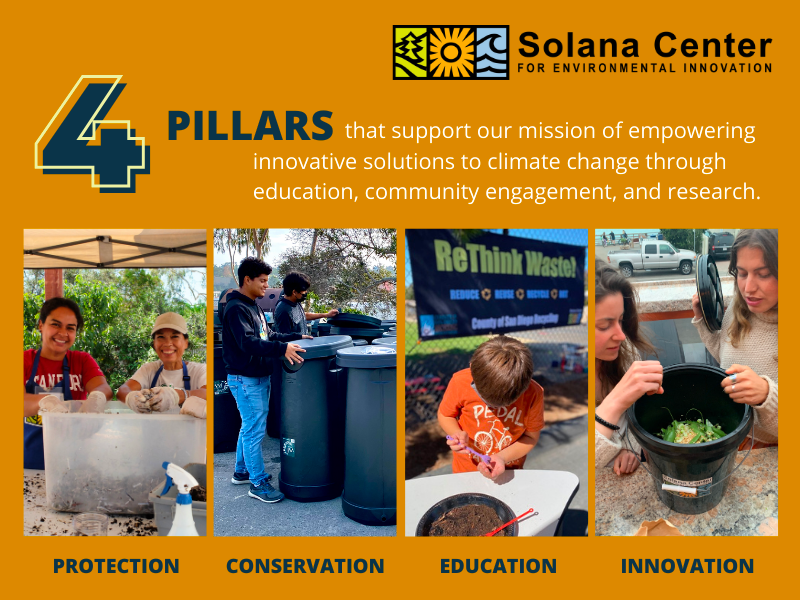
How does Solana Center protect local communities and habitats?
Food Recovery & Food Waste Reduction – Everyone has the right to healthy food and a healthy climate. Through SB 1383 consultations, Solana Center advises businesses on how to donate more of their excess healthy food to feed people in need and divert inedible food from the landfill via organics recycling. Unlike in the landfill, where food scraps are covered and deoxygenated and release methane as a result, in municipal composting and anaerobic digestion centers, food scraps either do not release methane (composting,) or that methane is captured and converted into natural gas (anaerobic digestion) instead of heading into the atmosphere.
With 1 in 4 people in San Diego County suffering from nutrition insecurity, the benefits of food waste diversion for people are threefold: hungry families receive good food, business owners achieve an average 14:1 ROI, and emissions from methane, a highly potent greenhouse gas, are reduced. Last year we helped 340 businesses expand their food donation and organics recycling initiatives. One such business was Hollandia Dairy.
Prior to the consultation, the dairy had attempted to donate milk but was rejected due to date code restrictions. However, with the exception of infant formula, sell-by dates aren’t actual expiry dates, and our Environmental Solutions team was able to mediate a deal in which the San Diego Food Bank would accept milk from Hollandia Dairy up to three days after the sell-by date.
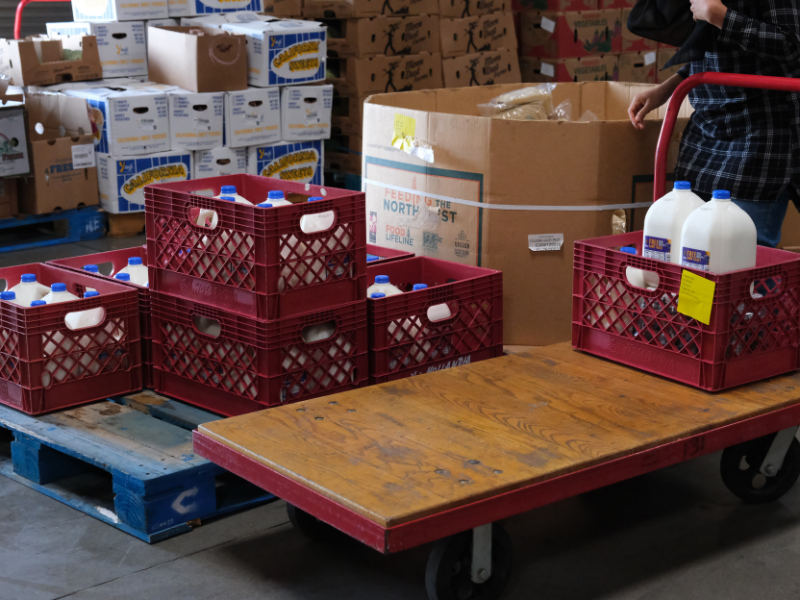
Still, another obstacle remained: Hollandia CEO Patrick Schallberger was concerned about receiving the business’ milk crates back, since, at $5 a piece, they would rack up quite a cost if not returned. The Food Bank agreed to return the crates, and in February of 2023, Hollandia donated 21,500 pounds of milk in just three weeks, providing an additional source of protein for Food Bank clients. In the past year, Solana Center has also connected the Imperial Beach School District with a nearby veterans’ organization and a local meat distributor to San Diego Rescue Mission, which provides temporary housing, food, and rehabilitation programs for homeless people throughout the county.
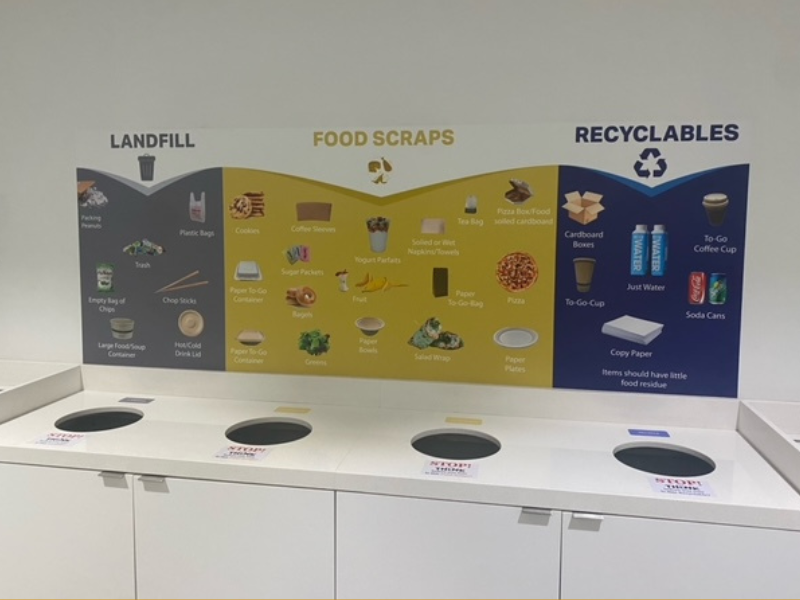
Inedible food scraps or expired food can still be transformed into a soil amendment, enriching gardens and agricultural land and reducing methane emissions. In 2014, Solana Center led a six-month pilot program to compost pre-consumer food waste from a fast food restaurant on agricultural land less than a mile away. The restaurant saved over $250/month on hauling and disposal fees. The compost was also five times more nutrient-rich than finished compost from a commercial wholesaler. Now that SB 1383 has gone into effect, Solana Center continues to provide guidance to food-generating businesses throughout the county on how to establish and maintain organics recycling programs. In the past year, we have worked with Costco to ensure they have two additional bins, one for food scraps and the other for recyclables, colocated wherever there is a garbage station in the store. We’ve also worked with Albertsons to improve their donation and organics sorting processes.
Solana Center also hosts webinars for community members on reducing food waste, as well as school workshops on waste sorting. Since a whopping 37% of food waste occurs at the household level, encouraging better habits around individual food purchasing and storage is crucial to reducing greenhouse gas emissions from the landfill. And when children learn why sorting their lunch waste is important, they learn about how their own actions influence the environment and how they can make small changes to create a big impact.
Other Zero- or Low-Waste Education – Solana Center also educates students and community members on how to reduce non-food-related waste! We host recycling and green bin webinars, composting workshops for gardens, ranches, and farms, and rain harvesting and water wise gardening workshops. We do all of this with the goal of a gentler, more sustainable relationship with the Earth. Please visit solanacenter.org/events to see current offerings.
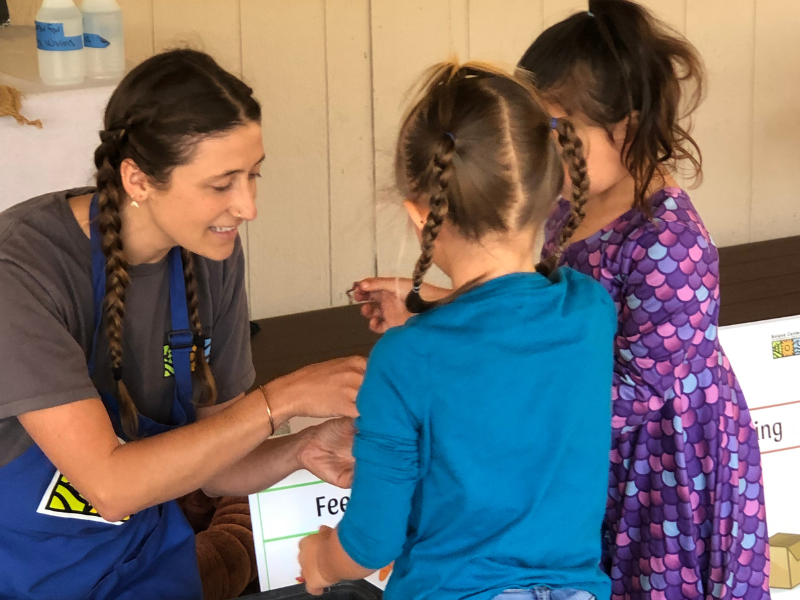
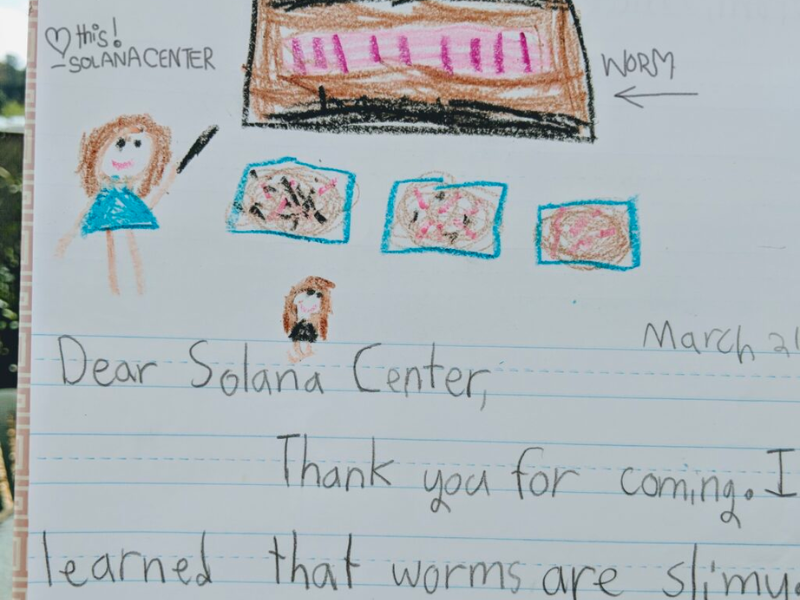
Hosting a Plastic Beach Recycling Hub – Plastic is made of fossil fuels. In 2019, the plastics industry generated 1.8 billion metric tons of greenhouse gas emissions, or 3.4% of the global total. Over 46% of plastic waste is landfilled and 22% becomes litter, harming marine animals, damaging soils and groundwater, and hurting human health. Plastic is a climate, pollution, and public health issue.
Plastic recycling does reduce the demand for new plastic production, even though it is only one small piece of the puzzle; we must also move towards more sustainable materials. We proudly support nonprofit Plastic Beach by functioning as a drop-off recycling hub for plastic bags and wrap. For more info on the drop-off subscription service or new curbside recycling service, please visit plastic-beach.com and use the “Our Programs” drop-down menu.

E-Waste & U-Waste Recycling – When e-waste is put in the garbage and sent to landfills, any heavy metals or flame retardants it contains contaminate underlying groundwater and crops planted in the area then and in the future, which adversely affects local people’s, animals’, and plants’ health. Depending on the levels, it may harm ecosystems past recovery. It may also make clean water, already a scarce resource in California, harder to find. By providing an additional e-waste and u-waste pickup location with the generous help of Urban Corps, Solana Center aims to create a safe process by which to dispose of nonfunctioning electronics and incorporate their materials into new ones.
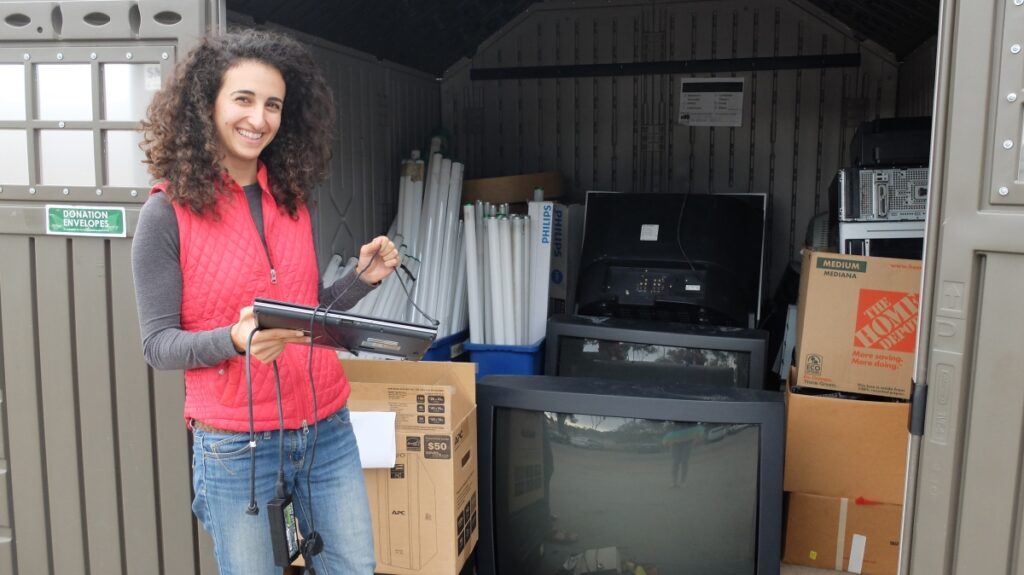
Sustainable Agriculture Support – Finally, Solana Center’s Healthy Soils Program helps farmers in San Diego, Riverside, and Imperial Counties apply for the California Department of Food and Agriculture’s (CDFA) Healthy Soils grant. Our team provides free application advice, as well as technical assistance once a farmer, rancher, or grower’s project is approved. The CDFA’s Healthy Soils grant program reduces greenhouse gases equal to removing 8,423 cars from the road each year. Last but not least, whereas artificial fertilizers send excess nitrates to our oceans, causing toxic algae blooms and harming marine life, compost does not. When we teach farmers, ranchers, and community members about compost, we protect our beautiful coastline for generations to come.
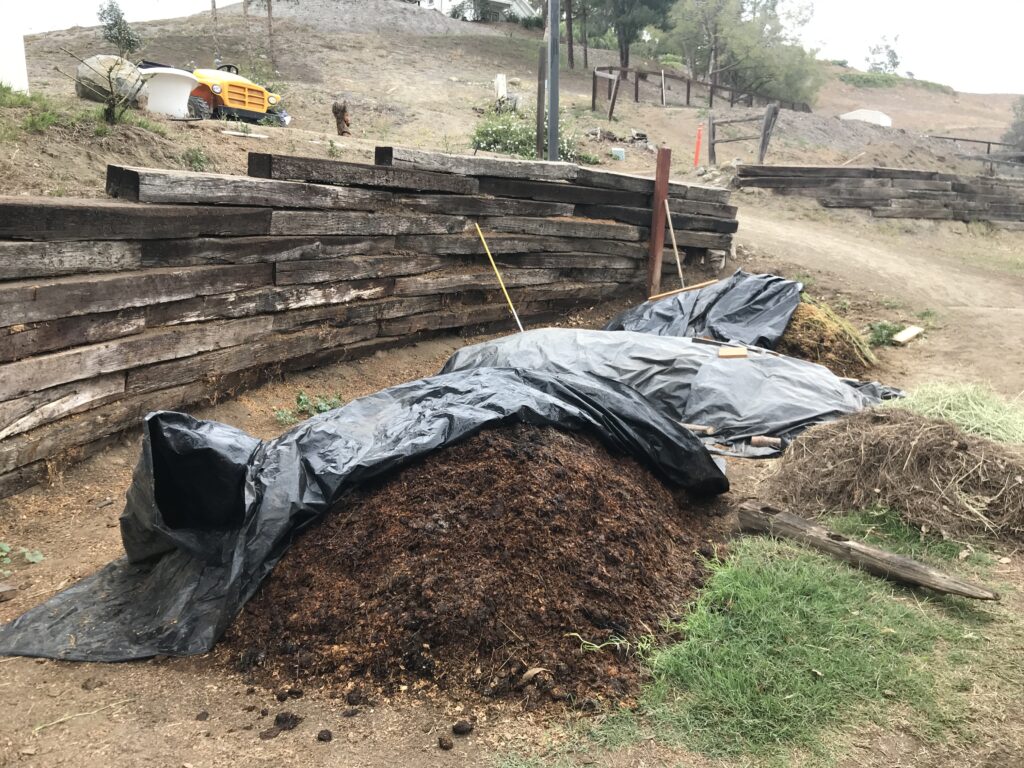
How else does Solana Center protect water resources?
Solana Center sells rain barrels subsidized by the North County Water District and the City of San Diego to help community members gather rainwater in their gardens before it enters our local watersheds. This water can be used directly on plants (though not on fruits and veggies themselves!) instead of being reprocessed at a water treatment facility. We also lead workshops on rainwater harvesting and water wise gardening and landscaping. Check out our events page to stay in the loop.
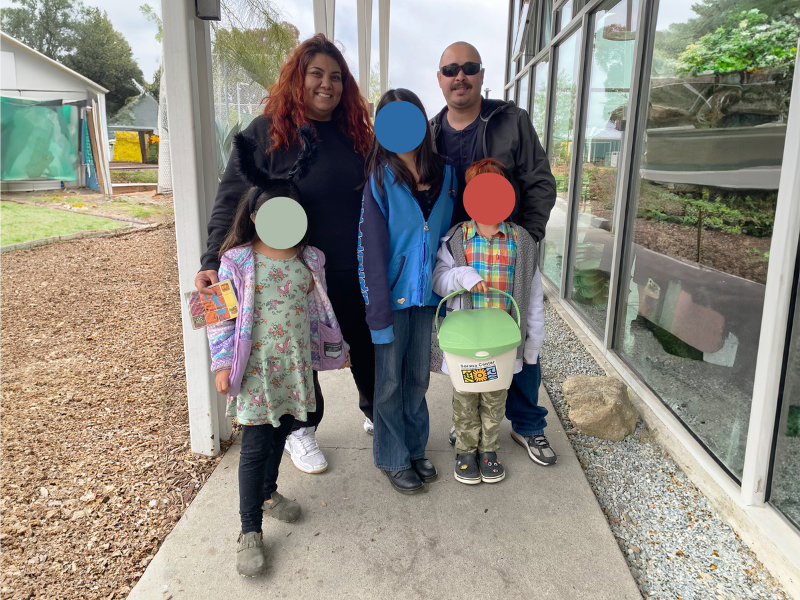
Textile Recycling – We will soon provide textile recycling as a necessary option when clothes and textiles can no longer be donated due to extended wear or staining. The fashion industry is the second largest consumer of water; it takes about 700 gallons to produce one cotton shirt and 2,000 gallons to produce a pair of jeans. Not only that, but the industry is the second-largest polluter of water, since dye byproduct is often dumped into nearby water sources. Finally, many corporate fashion “recycling” programs are just more greenwashing, helping residents of more developed countries assuage their eco-guilt while lowering the quality of life for citizens of the Global South.
Can’t wait for a program roll-out? Don’t worry! We have a textile recycling event coming up in March. Stay updated at solanacenter.org/events.
How does Solana Center aim to protect all people?
School Education – Solana Center receives funding from the City of San Diego and the County of San Diego to educate any interested school on lunch waste sorting, composting with worms, and how micro- and macro-organisms decompose organic materials, for free! In 2022, we also received two generous grants: one from Qualcomm to provide a full day of environmental education to 15 schools within Communities of Concern1, and the other from SDG&E to reach local Native American youth and adults through outreach and education. Learn more about those grants here.
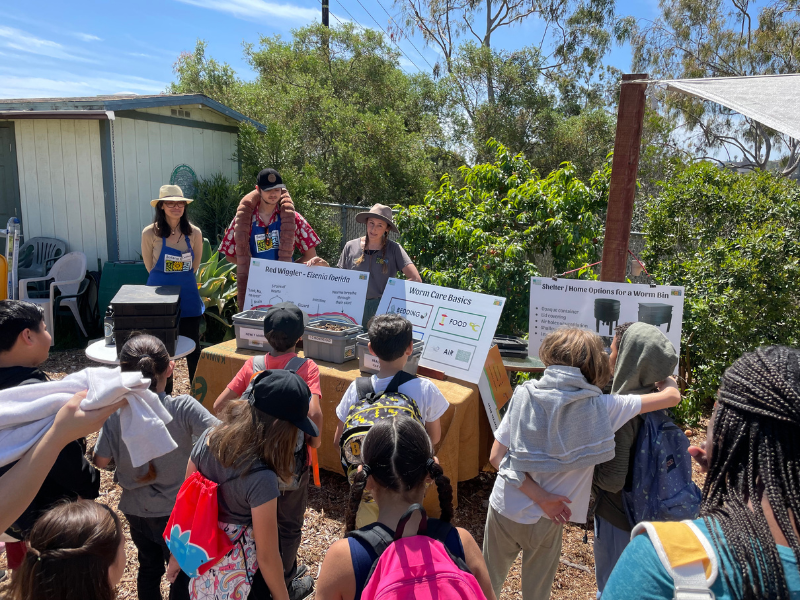
Because school funding typically prioritizes other pressing educational and social needs, environmental curriculum is often limited in low-income schools. Knowing that environmental education can actually be more important in these communities, since environmental issues disproportionately affect working class communities in which the members have little money or time with which to lobby against environmental health threats, our team continues to seek partners to provide this service throughout the region.
Spanish-language education: We also work to provide Spanish-language composting workshops, funded by the City of San Diego, so that more San Diegans can have access to a wonderful way to reduce food waste and nourish one’s garden. Keep an eye on solanacenter.org/events for upcoming offerings.
1San Diego Climate Equity Index. Learn more about the term and climate equity in San Diego here.
